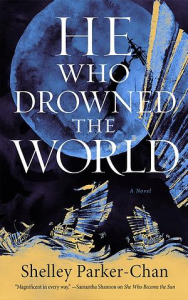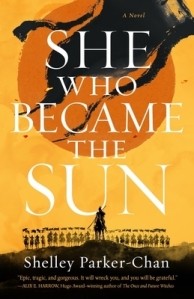Title: He Who Drowned the World
Series: Radiant Emperor duology #2
Author: Shelley Parker-Chan
Genre: Historical Fantasy
Trigger Warnings: Violence, blood, injury, death, bullying, self-harm (graphic), grief (severe), sexual content (explicit), misogyny, ableism, sexual assault, miscarriage, infidelity, murder, child death, parent death (mentions), suicidal ideation, body dysmorphia, homophobia, that complicated sexual trauma where you have sex when you don’t really want to as a means to get something else
Spoiler Warning: This book is second in a series, and reading beyond this point will expose you to spoilers of the first book, She Who Became the Sun.
Back Cover:
How much would you give to win the world?
Zhu Yuanzhang, the Radiant King, is riding high after her victory that tore southern China from its Mongol masters. Now she burns with a new desire: to seize the throne and crown herself emperor.
But Zhu isn’t the only one with imperial ambitions. Her neighbor in the south, the courtesan Madam Zhang, wants the throne for her husband—and she’s strong enough to wipe Zhu off the map. To stay in the game, Zhu will have to gamble everything on a risky alliance with an old enemy: the talented but unstable eunuch general Ouyang, who has already sacrificed everything for a chance at revenge on his father’s killer, the Great Khan.
Unbeknownst to the southerners, a new contender is even closer to the throne. The scorned scholar Wang Baoxiang has maneuvered his way into the capital, and his lethal court games threaten to bring the empire to its knees. For Baoxiang also desires revenge: to become the most degenerate Great Khan in history—and in so doing, make a mockery of every value his Mongol warrior family loved more than him.
All the contenders are determined to do whatever it takes to win. But when desire is the size of the world, the price could be too much for even the most ruthless heart to bear…
Review:
This is a hard book to review. Not because it was bad, or even because I’m ambivalent about it – on the contrary, it was spectacular and I loved it. Even having read the first book nearly two years ago, it didn’t take me long to get back into the story. It kept me engaged throughout and even got my heart speeding up in a few particularly tense scenes. It was, above all, astonishingly good.
And I think that’s a large part of what makes it hard to review. I can’t share all the emotions it made me feel by writing about it. To get the full experience, you have to read it yourself. It’s vivid and intense and full of twists I didn’t see coming but probably should have and the kind of book that leaves you completely exhausted at the end because you’ve been feeling so much along the way.
Another part of what makes this hard to review is how utterly dark it is. The first book was dark, too, don’t get me wrong. Zhu is not a good person. She is ruthless and ambitious and claims she is willing to sacrifice anything to reach her goal, and this book puts that to the test. This is also a book where Zhu starts to challenge the bounds of a likeable character. In the first book, she was ruthless and ambitious and violent and did a lot of really horrible things. But in the context of a world that would rather let her starve than inconvenience a man, it didn’t seem unreasonable. In this book, she had reached some measure of security – though still under threat, she was one of the four dominant military and political powers of the area. But her ambition to be the greatest kept her pushing onwards, even as she destroyed others in the process. She was still a dynamic, compelling character and I never really stopped rooting for her, but as the book progressed I found myself repeatedly confronting the reality of her actions and not really being sure how to feel about them. In some ways, it feels weird to even apply moral judgements here, though I can’t fully explain why. But eventually both I and Zhu were looking at the consequences of her ambitions and wondering if it was really worth all that.
(Yet another thing I appreciate about this series: None of the women in these books – whether or not you want to count Zhu and her ambiguous gender identity as a woman – are shamed for their ambition or treated any worse than the men for their crimes. The society is blatantly misogynistic, but the narrative refuses to be.)
General Ouyang was a major player in the last book, and he still is in this one, but to a lesser degree. Some of that is because of his arc. Following on the events from the climax of book one, his is an equal but opposite story to Zhu. While Zhu’s ambitions propelled her to further heights, Ouyang’s relentless pursuit of revenge drove him to further lows. Zhu’s resolve clarified as Ouyang’s mind descended into chaos. I found myself mainly feeling compassion as he destroyed himself on the teeth of his own self-loathing. I wish he could have had a better ending, but he was so far gone that I think he got the best he could.
This book, being the last in the series, was an ending for every character, though not all of them died. Writing-wise, their endings made sense, fit with their arcs, and felt narratively satisfying. On a personal level, so many of them deserved better. Xu Da deserved better. Ma deserved better. Ouyang deserved better. Even Baoxiang deserved better (he deserved better last book, and even before – he is yet another case of an antagonist who I really just feel bad for).
And this brings me to the final reason this book is so hard to review: There is just too much to say. I haven’t said anything about Baoxiang’s story, even though he was a point of view narrator. I haven’t talked about the gender politics involved in this story, or the absolutely spot-on depictions of that very specific and hard-to-define type of sexual trauma where you have sex when you really don’t want to or with someone you don’t want to have sex with as a means to get something else, or the theme of being seen in a gendered body (and, to a lesser extent, a visibly disabled body), or how it’s paced so well that it feels like so much is happening without ever feeling rushed or monotonous, or the really awesome historical setting, or the ghosts.
If I talked about every amazing thing in this book, I could go on forever. But I’ve focused this review mainly on the characters, because despite all the action and adventure and ghosts and politics and invasions, this is a story about these characters and how their actions, good, bad, or otherwise, shape (and often end) the lives of the people around them and, ultimately, the course of history. This feels like a book (and, honestly, a series) that you could keep re-reading and discover something new every time. (It helps that these books are long.) So few sequels live up to their predecessor, but this one does – but it’s also unique to the point where I can’t say whether She Who Became the Sun or He Who Drowned the World is better because they’re both so good for different reasons and in different ways.
I’m running out of eloquent ways to say “this is an amazing book, you should read the whole series,” so there you go. This is an amazing book. So was the first one. You should read both – especially if you like stories that show your emotions no mercy.
The Radiant Emperor duology:
- She Who Became the Sun
- He Who Drowned the World


